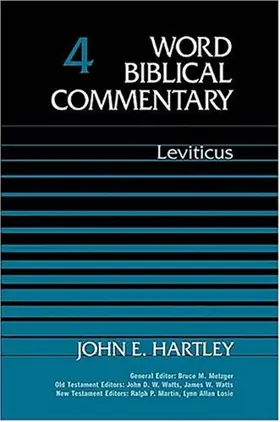

Leviticus
Pages
575
Publisher
Thomas Nelson
Published
1/1/1992
ISBN-13
9780849902031
Collections
This book appears in the following featured collections.
- John Piper's OT Commentary Recommendations by John Piper (Desiring God)
- Tremper Longman's 5-Star Commentaries by Tremper Longman III
- Ultimate Commentary Collection: OT Technical by John Glynn
- Old Testament Advanced Commentaries by Moore Theological College Journal: Societas
- Basic Library Booklist by Detroit Baptist Theological Seminary
- TGC: Scholarly Commentaries by The Gospel Coalition
Reviews
Hartley interacts well with the Hebrew text and provides helpful thoughts on New Testament connections. He also evaluates modern critical perspectives on Leviticus.
[Full Review]
It is hardly possible to find a review of any volume in the Word Biblical Commentary series that does not reference its unfortunate and annoying layout. Nevertheless, Hartley’s work comes recommended by several of the experts (who tell you to just try to work around that layout). This is the one volume John Piper recommends in his one-commentary-per-book round-up.
[Full Review]
If you can afford more than one commentary on Leviticus, Hartley's commentary in the WBC series is a good choice. It supplements Wenham well. The only drawback, as with all volumes in the WBC series, is the layout. Once the reader becomes used to it, however, it is not as much of an issue.
[Full Review]
John Hartley's WBC (1992) is probably the most detailed evangelical work. I've heard mixed reports on how evangelical Hartley is. One of his former students tells me that most evangelicals would consider him weak on inerrancy. I've also read reviews that speak of Hartley as a solid evangelical. I haven't spent enough time in any of his commentaries to judge on that issue, but I do have the sense that he's in the more moderately critical range, more conservative than most critical scholars but probably not as conservative as most evangelicals (including Wenham). He thinks the core of the book goes back to Moses, but later settings served as an occasion to work in further applications of what was there. He does give time to theology, Christian interpretation, and contemporary application, which you won't find in most of the other detailed commentaries on the Hebrew text. Like other WBC volumes, Hartley uses the Hebrew font on comments directly on the Hebrew text. The annoying WBC format also makes me less inclined to want to spend much time looking at this volume.
[Full Review]








